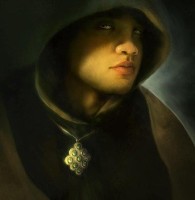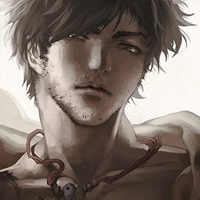Winter 40, 512 AV
Maria Satterwite Memorial Cemetery
----------------------------------
The Satterwte Cemetery is beautiful in the early afternoon light, the white snow like a continuation of the the marble stone, and a striking contrast to the black floor of the open peristyle of the temple. The preparations began early, today, a Nuit overseer watching workmen hack a hole in the ice of the pool, then stirring it to keep it from freezing again, craftsmen of the city coming to set up a temporary scaffolding for the coffin, the florists coming to bedeck it with the withered, dried blooms of summer, and even, ostentatiously some might say, a few forced hothouse blooms. Black linen is lain over the bier itself.
The people began to arrive mid-morning, a priest from the temple of the sea, and a contingent of the cemetery's keepers. These performed ritual cleanings of the temple, and the sea priest blessed the bier for its coming weight.
But in the afternoon, the procession began. The winding path to the cemetery is easy with a team of dray horses, but the coffin is born on the shoulders of 13 members of the sailors guild, all in their gleaming dress regalia, the navy blue of the guild itself on one side, and the other born by the azure coats of Wave Guard. At the front, in the symbolic white of the chief mourner, keeping one, more ceremonial than practical, hand on the coffin, is the widow. She walks steadily, her dark, Zeltivan hair, set wild after the old fashion of the mourner. Her free hand holds that of her three your old son, who the blue and golden sash of the Wave Guard, his father's guard-crest pinned at his shoulder, hug on his tiny body. A man, in black, a relative, walks nearby, in case the child grows tired, but he is a son of Zeltiva. He knows what this walk is, what it means, and he walks beside his mother.
Behind, the train of Mourners begin. The place of precedence is given to the family, who wear their best black crepes, with two younger fellows in the blue of the sailors guild interspersed. Behind walks the contingent of the Sailors Guild and the Wave Guard, who talk together, here, all blazing in their dress best, each wearing a band of black linen on their arm. A fifer and drum march at their front, playing the mournful march of the dead, and In the back three boys march in the square collars of the old dress, now defunct but for ceremonial occasions. Each bears an oar, held upright, each with a gilded word carved in the blade: "City","Guild", and "Fellow-men", glittering in the sharp, winter-cold sun. Beneath these walk two honor guards, with a silver casket heavily borne between them.
Behind, these, in less martial but more colorful array, is an honor contingent from the university. Professors walk in somber step, dressed in full academic dress, the gown, the gown, the epitome, the sash, the Tam-bonnet of the New Wing, and the Andrewes Cap of the Auld Wing, the fur hoods of the librarians, and the mitre of the chancellors. The robes burn in bright damascene hues of poplar, grosgrain, satin, Russel cord, their hues denoting the school from whence they originate. At the rear, the standard bearers of the school walk, bearing the banners of the colleges, and in the center, a single cowled figure with the Dread Banner, the banner of the dead, its words written in Old Common-tongue: "Ab Ghardi Hallibu, Ab Ghardi dune", "The Earth, the suckler's breast; the Earth, the final bed."
Behind this comes the final of the great parties, the office of the Government of the city. Ceremonial as they are, this is their element, and they shine in the silk robes of state, the ceremonial trident borne before on a velvet black pillow, draped in white mourner's samite.
And then, the mourner's train, a considerable one, and a mixture, still and somber. Even the thieves, by and large, are too frightened to case pockets on the sacred earth of the Dead, and most people have a great, isolating reverence, as they walk.
The space around the bier fills slowly, the guild given place of precedence, the scholars next. The government takes the right wing, the ceremonial place of the overseer. And the family, but for the widow and her son, are seated in the front. The widow, she stays standing, her white dress blowing in the cold wind, her son crying, silently. The coffin is laid gently on the bier, and the posting of the flags comes next - the standard of Zeltiva is planted by the government party, then the oars of the guild behind these, and the banners of the university to each side, but for the Dread banner, which is lain upon the earth.
Then the silver casket is brought forward, and the widow takes her son up to it. He reaches in, and so does she, and the two of them lift out a gleaming, golden-scaled Koi Fish, wriggling in their hands, and place him gently into the hole cut in the ice of the pond. As they do, the boy, in his best, brave voice, lisps out his father's name:
"Kip Drawlins of the Wave Guard. My Father."
Then begins the funeral itself. It is long, filled with the pomp and ceremony of a grieving city and a hero's honors, but remarkably, once the speaking begins, open, and almost informal - it is the Wave Guard's funeral, and true to the traditions of their brothers in the Sailors' Guild, they see death as the great equalizer. The bier is opened to whomever would speak. There is, of course, unspoken rules: everyone knows there are certain members expected to speak, and that no one should speak if they have no business doing so. The podium is a place for comfort, and for honor, rather than for politics or opinion. But it is open, and anyone is allowed to speak.
The widows speaks first - this is expected. She speaks very little: mercifully also expected.
"My husband... was a good man. My son and I... we are... right proud at what he done before he gone. Some men, they die for drink, and some men, they die for money. My Kip, 'e died for our city, and may his soul be blessed for 'at." she stifles a sob here, but continues, shakily, "And I know the city will care for little Kip and I, so my husband can rest here, and wait for the day when I come up this same 'ill, and lay down with 'im. Bless you, Kip, you done us all proud."
With this she slips back to sit in the seat provided for her at the edge of the bier. Her son, dazed, and still crying, clambers up in her lap.
(OOC: Kip Drawlins is the Wave Guardsman who was murdered in the line of duty in the East Street on Winter 36 (see the Chronicle for more details). Anyone who wishes to speak, and would have good reason to, is welcome to attach a speech here. I'll wait a week or so, then tack on the end of the funeral. IF you do not wish to speak, but attend the funeral, you are welcome to attach a post expressing as much, and what you did there, as well.)
- Getting Started
- Help
- Master Lists
- Useful Links
- Features
Open The Funeral of Kip Drawlins, Wave Guardsman
Kip Drawlins, a Guardsman brutally murdered in the line of duty, is buried with the full public honors of the city.
(This is a thread from Mizahar's fantasy role playing forums. Why don't you register today? This message is not shown when you are logged in. Come roleplay with us, it's fun!)
9 posts • Page 1 of 1
-

Philomena - Player
- Posts: 724
- Words: 718931
- Joined roleplay: December 29th, 2012, 3:40 am
- Race: Human
- Character sheet
- Storyteller secrets
- Scrapbook
- Medals: 1
-

-

Philomena - Player
- Posts: 724
- Words: 718931
- Joined roleplay: December 29th, 2012, 3:40 am
- Race: Human
- Character sheet
- Storyteller secrets
- Scrapbook
- Medals: 1
-

The Funeral of Kip Drawlins, Wave Guardsman
Last edited by Valo on January 12th, 2013, 5:09 pm, edited 1 time in total.
Red
-

Valo - The man who's very name means light
- Posts: 484
- Words: 431511
- Joined roleplay: October 15th, 2012, 5:14 pm
- Location: Zeltiva
- Race: Human, Mixed
- Character sheet
- Storyteller secrets
- Scrapbook
- Medals: 2
-


The Funeral of Kip Drawlins, Wave Guardsman
Lorem ipsum dolor sit amet, consectetur adipisicing elit, sed do eiusmod tempor incididunt ut labore et dolore magna aliqua. Ut enim ad minim veniam, quis nostrud exercitation ullamco laboris nisi ut aliquip ex ea commodo consequat. Duis aute irure dolor in reprehenderit in voluptate velit esse cillum dolore eu fugiat nulla pariatur. Excepteur sint occaecat cupidatat non proident, sunt in culpa qui officia deserunt mollit anim id est laborum.
Lorem ipsum dolor sit amet, consectetur adipisicing elit, sed do eiusmod tempor incididunt ut labore et dolore magna aliqua. Ut enim ad minim veniam, quis nostrud exercitation ullamco laboris nisi ut aliquip ex ea commodo consequat. Duis aute irure dolor in reprehenderit in voluptate velit esse cillum dolore eu fugiat nulla pariatur. Excepteur sint occaecat cupidatat non proident, sunt in culpa qui officia deserunt mollit anim id est laborum.
Lorem ipsum dolor sit amet, consectetur adipisicing elit, sed do eiusmod tempor incididunt ut labore et dolore magna aliqua. Ut enim ad minim veniam, quis nostrud exercitation ullamco laboris nisi ut aliquip ex ea commodo consequat. Duis aute irure dolor in reprehenderit in voluptate velit esse cillum dolore eu fugiat nulla pariatur. Excepteur sint occaecat cupidatat non proident, sunt in culpa qui officia deserunt mollit anim id est laborum.
-

Miles - Player
- Posts: 64
- Words: 52135
- Joined roleplay: December 19th, 2012, 3:03 am
- Blog: View Blog (1)
- Race: Human
- Character sheet
- Storyteller secrets
The Funeral of Kip Drawlins, Wave Guardsman
Sig by Shausha
This PC has the Blight gnosis. As such, you as a player need to be aware of what that consists of. Wrenmae has an invisible aura that amplifies sickness and disease. Wounds may become infected, small sneezes may become coughing, and a slight fever may become more serious. A nuit's body will also break down faster in the presence of the Blight. These effects may not be immediate, but within the few days following your encounter, the symptoms will manifest. Some sooner than others. I cannot control your character, so creativity will be left up to you. Best wishes and stay healthy!
Special shoutout to Fallon for my new CS
-

Wrenmae - Taleweaver
- Posts: 1806
- Words: 1276299
- Joined roleplay: April 15th, 2011, 6:34 am
- Location: Searching for a Tale worth Telling
- Race: Human
- Character sheet
- Storyteller secrets
- Scrapbook
- Medals: 9
-


-


-


-


-

Valo - The man who's very name means light
- Posts: 484
- Words: 431511
- Joined roleplay: October 15th, 2012, 5:14 pm
- Location: Zeltiva
- Race: Human, Mixed
- Character sheet
- Storyteller secrets
- Scrapbook
- Medals: 2
-


The Funeral of Kip Drawlins, Wave Guardsman
Lorem ipsum dolor sit amet, consectetur adipisicing elit, sed do eiusmod tempor incididunt ut labore et dolore magna aliqua. Ut enim ad minim veniam, quis nostrud exercitation ullamco laboris nisi ut aliquip ex ea commodo consequat. Duis aute irure dolor in reprehenderit in voluptate velit esse cillum dolore eu fugiat nulla pariatur. Excepteur sint occaecat cupidatat non proident, sunt in culpa qui officia deserunt mollit anim id est laborum.
Lorem ipsum dolor sit amet, consectetur adipisicing elit, sed do eiusmod tempor incididunt ut labore et dolore magna aliqua. Ut enim ad minim veniam, quis nostrud exercitation ullamco laboris nisi ut aliquip ex ea commodo consequat. Duis aute irure dolor in reprehenderit in voluptate velit esse cillum dolore eu fugiat nulla pariatur. Excepteur sint occaecat cupidatat non proident, sunt in culpa qui officia deserunt mollit anim id est laborum.
Lorem ipsum dolor sit amet, consectetur adipisicing elit, sed do eiusmod tempor incididunt ut labore et dolore magna aliqua. Ut enim ad minim veniam, quis nostrud exercitation ullamco laboris nisi ut aliquip ex ea commodo consequat. Duis aute irure dolor in reprehenderit in voluptate velit esse cillum dolore eu fugiat nulla pariatur. Excepteur sint occaecat cupidatat non proident, sunt in culpa qui officia deserunt mollit anim id est laborum.
-

Miles - Player
- Posts: 64
- Words: 52135
- Joined roleplay: December 19th, 2012, 3:03 am
- Blog: View Blog (1)
- Race: Human
- Character sheet
- Storyteller secrets
-

Philomena - Player
- Posts: 724
- Words: 718931
- Joined roleplay: December 29th, 2012, 3:40 am
- Race: Human
- Character sheet
- Storyteller secrets
- Scrapbook
- Medals: 1
-

9 posts • Page 1 of 1
Who is online
Users browsing this forum: No registered users and 1 guest
